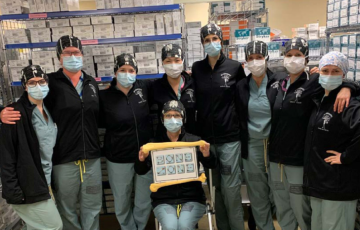Effective June 3, 2024 – Administrative fees for Environmental Public Health will increase for comfort letters and temporary food service applications not received 14 days before an event. These changes will align Island Health’s fee structure with those at other health authorities.
Environmental Health Officers (EHO) conduct more than 7,000 inspections of restaurants, food facilities and stores annually. EHOs educate food handlers and consumers about safe food handling practices and assess compliance with the Food Premises Regulation.
Find Food Facility Inspection Reports
Health Operating Permits and Approvals
Under the Food Premises Regulation, a food premises refers to any place where food intended for public consumption is offered for sale, supplied, handled, prepared, packaged, displayed, served, processed, stored, transported or dispensed.
Food service establishments include food premises where foods are processed and intended for immediate consumption such as restaurants, take-outs and caterers. A health operating permit is required to operate a food service establishment.
Food premises such as food stores and food processors where food is not intended for immediate consumption do not receive a permit but are required to obtain approval to operate.
Mobile food premises may require a health operating permit or an approval to operate. More information is available in the provincial Mobile Food Premises Guideline.
Operating permits and approvals are not transferrable to new owners. Please see our Guide to the Application Process for more information on general requirements.
How to Apply
To operate a food premises, submit an application package to the local Environmental Public Health office.
The application package must include:
- Application Form
-
An application for a Food Facility form should be submitted for each food premises type. A copy of legal ownership documentation is required if the ownership type is a corporation, society or partnership.
Ownership types include sole proprietor, society, corporation or partnership.
- If ownership type is a corporation or society, include a copy of the “Certificate of Incorporation”. This document is filed with the government when the business or society was incorporated.
- If the ownership type is a partnership, include a copy of the legal partnership agreement.
- Floor Plan and Equipment Specifications
-
A copy of floor plans and equipment specifications must be submitted for review and approval by the Environmental Health Officer prior to construction. Floor plans should be drawn to scale and clearly labelled.
Sample Floor Plan
- Menu
-
A list of menu items should be provided. Environmental Health Officers should be consulted where menu items change.
- Food Safety Plan and Sanitation Plan
-
Food Safety Plans and Sanitation Plans are required for all food service establishments and food processors.
- FOODSAFE Level 1 certificate (or equivalent)
-
Every operator of a food service establishment must hold a valid FOODSAFE Level 1 certificate or its equivalent.
FOODSAFE Level 1 certificates issued in British Columbia are valid for five years. Visit the www.foodsafe.ca for more information on FOODSAFE training and equivalent courses.
For a replacement FOODSAFE certificate, please call 250-737-2017 or email foodsafe@islandhealth.ca
- Permit Fees
-
Food service establishments are issued a health operating permit and are required to pay an annual permit fee. For seasonal establishments, the fee is based on the number of operating months.
Permit fees can be paid in person at a local Environmental Public Health office or via telephone. Visa, Mastercard or cheques accepted (payable to Island Health).
More information is available on the provincial Guideline for Food Operating Permits and Fees.
Note: Food facilities are required to connect to a water supply system that complies with the Drinking Water Protection Act and Drinking Water Protection Regulation and wastewater disposal system that complies with the Sewerage System Regulation or other governing agencies. Where a food premises is not connected to a community water supply system or sewer system, contact your local Environmental Public Health office or visit our Drinking Water and Sewage Disposal pages for more information.
Pre- Opening Inspection
When the application package has been reviewed and approved, the Environmental Health Officer will conduct a pre-opening inspection to ensure the facility is constructed in accordance with the approved plans and in compliance with the Food Premises Regulation. Once satisfied that all requirements are met and permit fees paid (if applicable), the Environmental Health Officer will issue a health operating permit or grant approval to operate. Note: Health approval must be granted prior to opening.
Temporary Food Events and Markets
The Planning Guide for Temporary Events and Markets is a resource for event and market organizers to help them understand their responsibilities and describes the steps required to acquire health approval.
Temporary Food Events
Temporary Food Events are public gatherings that are held on a temporary basis such as fairs, festivals, fundraisers and conventions.
- Event Coordinator Requirements
-
An Event Coordinator is required for a temporary events with more than one vendor who is responsible for overseeing the event. An Event Coordinator must submit an Event Coordinator Application form to the local Environmental Public Health office at least 14 days prior to the event (one month in advance is recommended).
- Vendor Requirements
-
Vendors selling food at a temporary event must submit a Temporary Food Service Application form to the local Environmental Public Health office and obtain a Temporary Food Service Permit prior to food service. Home-prepared food for the public is not allowed at temporary events. An approved commercial kitchen must be used for any food preparation done prior to the event.
Note: Temporary Food Service Applications must be received at least 14 days prior to the event. A $50 administration fee will be applied to all applications received less than 14 days prior to the event. Submissions received less than 2 business days prior to an event may be denied. The Temporary Food Service Permit issued can only be used a maximum of 14 days per calendar year.
Temporary Food Markets
Temporary Food Markets are markets where vendors are local farmers, artisans or crafters that sell fresh produce, baked goods, handmade crafts and artisan goods directly to consumers and include farmers markets, craft markets or similar.
- Market Manager Requirements
-
A Market Manager is required for temporary food markets who is responsible for overseeing the market and ensures all requirements of the provincial Guidelines for Sale of Food at Temporary Food Markets are met. The Market Manager must submit a Market Manager Application form Market Manager Application form to the local Environmental Public Health office at least 14 days prior to the market.
- Sale of Lower Risk Foods at a Market
-
Vendors selling lower risk foods should consult with the Market Manager to confirm requirements of the provincial guideline are met. Sampling of lower risk foods must meet all requirements outlined within the provincial guidelines.
- Sale of Higher Risk Foods at a Market
-
Vendors selling higher risk foods will require a Letter of Confirmation/Approval from their local Environmental Public Health office. To obtain this letter, vendors will submit an Application for Sale of Higher Risk Food at Temporary Food Markets to their local Environmental Public Health office. A copy of the letter should be kept with the vendor at the market as verification that health approval has been granted for sale of the higher risk food.
Onsite food preparation including food sampling of higher risk foods is not permitted without a permit. Please review the section on Food Sampling and Onsite Food Preparation at Markets for more information.
- Food Sampling and Onsite Food Preparation at a Market
-
Vendors offering sampling of higher risk foods or onsite food preparation including cooking, re-heating, hot-holding or assembling will require a Temporary Food Service Permit. A temporary food service permit can be obtained by submitting a Temporary Food Service Application form to the local Environmental Public Health office.
Note: Temporary Food Service Applications must be received at least 14 days prior to the market. A $50 administration fee will be applied to all applications received less than 14 days prior to the event. Submissions received less than 2 business days prior to an event may be denied. The Temporary Food Service Permit issued can only be used a maximum of 14 days per calendar year.
Heat Safety Planning Recommendations for Outdoor Events is a planning tool for event organizers on how to reduce heat exposure and avoid heat injuries at outdoor events. It outlines key considerations to help protect the health and well being of event attendees during the summer. This tool can be used to plan your event (does not need to be submitted).
Resources
- Handouts and Signs for Operators
-
- Additional Resources
-
- Industry Guidelines
-
- Emergency Preparedness
-



